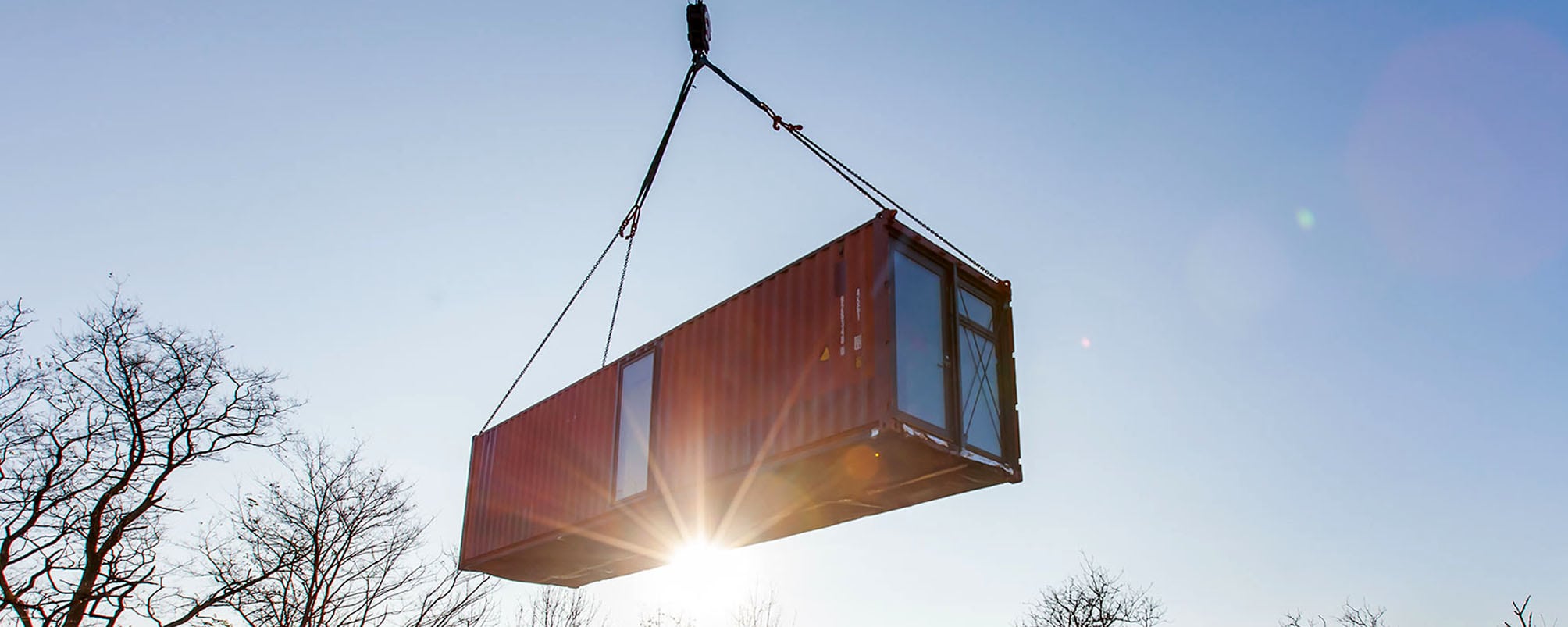
Q&A about the construction method
The approval procedures are identical to those for conventional building construction. Despite their permanent mobility, buildings made of containers are subject to approval and require a building permit. Our modules are subject to extensive static calculations, fire protection, and sound insulation reports, and the monolithic wall structure meets the requirements of the EnEV 2016. Following with the respective state building regulations, the modules require a project-related building permit (vBG) or approval in individual cases before they can be used in structural installations.
Containerwerk makes a sustainable contribution to an improved eco-balance by reusing sea freight containers. Instead of ending up in the scrap press, the container finds its way to a new, long-term destination.
Our containers are industrially cleaned before removal. In cooperation with our container suppliers, we define selection criteria and only receive used containers that meet our quality standards in terms of static and structural factors, but also the absence of pollutants.
The interior surfaces of the container are sealed by our wall structure/PUR foam. In such an insulated container, we conducted an emission measurement on our own behalf to identify, for example, residues from fumigation (the procedure used to protect the container interior from pest or mold infestation). Infrared spectra were used to measure for fifty substances. The result: no elevated pollutant concentration was detected, and in some cases, the substances were even close to the detection limit.
In terms of building physics, our modules are flawless, have been extensively tested by independent testing institutes, and offer an exceptionally high quality of stay that is comparable with conventional buildings. The modules are produced under consistently good conditions in our production halls, where all trades can be optimally coordinated, harmonized, and controlled. Proven detailed solutions, standardized processes, and continuous monitoring guarantee the high quality of the modules, which are up to ninety percent prefabricated in the production hall. In conventional construction, by the way, the elimination of defects is demonstrably the biggest cost driver; they arise primarily from poor coordination of the trades on the construction site and from inadequate quality monitoring.
Our modules are manufactured in industrial production at the manufacturing plant. This offers considerable advantages over conventional construction methods. Shorter construction times thanks to parallel processes and weather-independent production as well as the resulting earlier utilization options of the buildings and faster refinancing provide a monetary advantage and, above all, planning, cost, and schedule reliability.
The use of high-quality building materials, standardized workflows, and ongoing quality assurance processes ensure consistently high quality, while waste and material consumption are optimized. Furthermore, there are no emissions from noise and dust on the construction site during the short erection times.
The sustainability of the modules can be documented over their entire life cycle. The reuse of sea freight containers significantly reduces the energy required to manufacture the modules (so-called gray energy). During production in the manufacturing plant, resources are conserved through the optimized use of materials.
Due to the high degree of prefabrication, the environmental impact of dirt, noise, and construction waste is reduced to a minimum when the modules are assembled on site.
Once the buildings are in operation, the high-performance insulation ensures outstanding insulation values and, together with optimized energy concepts, low operating costs. Depending on the energy concept, buildings according to KfW efficiency standards for houses are possible. All container modules can be fully recycled by Containerwerk at the end of their useful life. In line with the principles of recycling management, the materials are separated by type, disposed of properly, or returned to the technical cycle.
Containerwerk is a member of the Deutschen Gesellschaft für Nachhaltiges Bauen (DGNB e. V.) – “German Sustainable Building Council”. This is in line with our philosophy, which is to create future-oriented and sustainable living space.
Our modules meet all building physics requirements and create an optimal indoor climate in winter and summer. Furthermore, we prefer to use healthy materials for a comfortable feeling in the room.
Due to the industrial processing, the associated set-up times, and the project-related planning effort, individually planned, smaller projects are usually not economical. Therefore, we alternatively offer pre-planned modules as finished product solutions in various stages of completion. Our range extends from the insulated shell of the module ex-works, prepared for further interior work by the customer, to a ready-to-occupy module including bathroom, technical building equipment, electrics and finished surfaces, to the fully furnished Tiny House.
We are pleased to invite you to visit our showrooms at the production site in Wassenberg or our site in Stuttgart by prior appointment. In Wertheim, there is also the possibility to book overnight stays in a boarding house, which was built with modules from Containerwerk. All over Germany, there are reference projects, some of which can be visited after consultation with the building owners. Please feel free to contact us in this regard.
We are currently developing a Tiny House in a 40FT container with 25 square meters of living space, which will be available to order from 2021. Optionally, it is available as a fully furnished version ready for occupancy or as a “refined carcass” for the craftsman-talented builder to build out on his own. Please note that this Tiny House is subject to the building code and requires a permit.